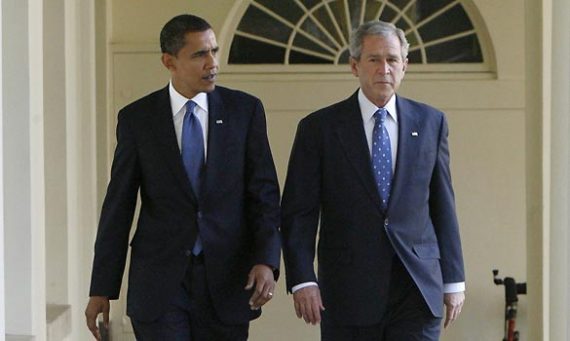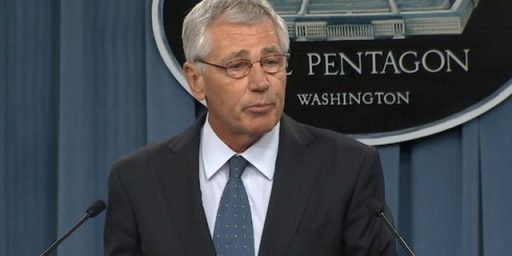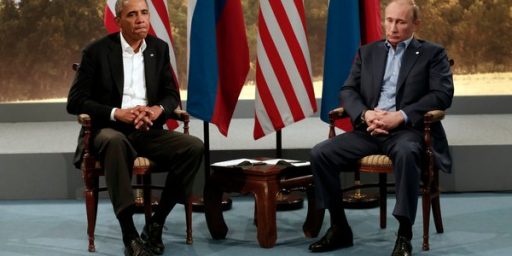Obama Administration vs Bush Administration on Syria
Score one for Team Bush?
Rowan Scarborough thinks he has a gotcha:
The Obama national security team that wants to go to war with Syria and demonizes President Bashar Assad is the same group that, as senators, urged reaching out to the dictator. As a bloc on the Senate Committee on Foreign Relations, President Obama, Secretary of State John F. Kerry, Defense Secretary Chuck Hagel and Vice President Joseph R. Biden all opposed the George W. Bush administration’s playing tough with Mr. Assad.
As ledes go, this is pretty silly. It’s hardly a failing to hope that a transition in power will serve as an opportunity for improved relations, much less to change course once this hopes prove unfounded. As John Maynard Keynes is often quoted as saying, even if he never did, ”When the facts change, I change my mind. What do you do, sir?”
The back story, though, is interesting in that its a case where the previous administration’s instincts seem to have been better.
None grew closer to Mr. Assad and promoted him in Washington more than Mr. Kerry.
“President Assad has been very generous with me in terms of the discussions we have had,” Mr. Kerry, as a senator from Massachusetts, told an audience at the Carnegie Endowment for International Peace in March 2011. He predicted that Mr. Assad would change for the better.
But that same month, pro-democracy demonstrations erupted in Syria that would lead to a civil war, unmasking Mr. Assad’s brutal tactics, including the Aug. 21 unleashing of nerve gas that killed more than 1,400 civilians.
Today, Mr. Kerry is a leading advocate for attacking Mr. Assad’s regime. On Friday, he called the man he once befriended a “thug and murderer.”
Again, though, I’m not sure what this proves. I oppose Kerry’s policy aim—US military action in Syria—but concur wholeheartedly in his current assessment of Assad.
When Mr. Assad succeeded his late father, Hafez, as dictator in July 2000, there was hope in Washington that the young ophthalmologist who was trained in London would shift the country from its brutal ways in neighboring Lebanon and its deep association with Iran and terrorism.
But in the Bush administration’s view, Mr. Assad proved as devious as his father. He increased ties to Hezbollah and Hamas, two U.S.-designated terrorist groups backed by Iran, and grew even closer to Iran, which used Syria to pass rockets to terrorists. In 2005, the Assad regime rocked Lebanon by playing a role in Hezbollah’s assassination of former Lebanese Prime Minister Rafik Hariri, who had led an anti-Syrian bloc in Beruit. By that year, Mr. Assad had begun helping al Qaeda by opening his country to jihadists who passed through the Damascus airport on their way to safe houses and then across the border into Iraq, where they killed U.S. troops. The Bush administration made repeated demands in Damascus for Mr. Assad to stop the flow of al Qaeda killers but saw no progress. Noting that behavior, the Bush national security team refused to engage Mr. Assad in peace talks until he changed.
That stance riled senators, especially Mr. Kerry, Mr. Hagel and Mr. Biden.
Secretary of State Condoleezza Rice explained the administration’s position on Mr. Assad to the Senate Committee on Foreign Relations in 2007. ”If there were any evidence, any hint, that Syria was changing its course — and it should just change its course — we don’t have an ideological problem with talking to Syria,” Ms. Rice testified. “We’ve talked with them under this administration. We could do it again. ”But the problem is, they are not engaging in constructive behavior. And we don’t see how that would change, currently, by talking to them.”
Mr. Biden, then the committee’s chairman, scolded her and reminded her of her duties. ”I do not agree with your statement, Madame Secretary, that negotiations with Iran and Syria would be extortion, nor did most of the witnesses we heard in this committee during the last month,” Mr. Biden said. “The proper term, I believe and they believe, is diplomacy, which is not about paying a price but finding a way to protect our interests without engaging in military conflict. It is, I might add, the fundamental responsibility of the Department of State, to engage in such diplomacy, as you well know.”
When it was his turn, committee member Mr. Hagel asked three times why Ms. Rice would not engage in direct talks with Mr. Assad. ”Have you included in those conversations, whether second- or third-party conversations, Iran and Syria?” Mr. Hagel said. “Because I don’t know how we could come up with any kind of a plan or focus, working with the United Nations or anyone else, if Iran and Syria are not included in that.”
One of Mr. Obama’s major foreign policy positions as a senator was unconditional direct talks with the leaders of Iran over its quest for nuclear weapons. He also favored talks with Mr. Assad. Once in office, Mr. Kerry became his main emissary to Damascus, engaging in talks there in 2009, a month after Mr. Obama took office, and 2010, marking his third and fourth visits as a senator.
Before the 2009 visit, the U.S. Embassy in Damascus sent a cable to Mr. Kerry and other senators on the trip. ”You should expect an enthusiastic reception by government officials of the Syrian Arab Republic (SARG) and from the media, who will interpret your presence as a signal that the [U.S. government] is ready for enhanced U.S.-Syrian relations,” said the cable, published by the anti-secrecy website WikiLeaks. “Your visits over the course of February 17-22 form a trifecta that Syrians will spin as evidence of the new Administration’s recognition of Syria’s regional importance.”
At the Carnegie Endowment for International Peace in 2011, Mr. Kerry was full of praise for Mr. Assad as the civil war in Syria erupted, and he predicted that the dictator would become a good actor. ”So my judgment is that Syria will move,” he said. “Syria will change as it embraces a legitimate relationship with the United States and the West and economic opportunity that comes with it and the participation that comes with it.”
That month, Secretary of State Hillary Rodham Clinton, another alumnus of the Senate Committee on Foreign Relations, told “Face the Nation” on CBS that lawmakers who had visited Mr. Assad considered him a “reformer.” The U.S., she said, did not need to contemplate military action against Syria. ”There’s a different leader in Syria now,” Mrs. Clinton said. “Many of the members of Congress of both parties who have gone to Syria in recent months have said they believe he’s a reformer.”
Did the Bush, Rice, and others in the administration correctly assess Assad while Biden, Hagel, and Clinton got it wrong? Maybe. But it’s not obvious from the exchanges above. Biden and Hagel, in particular, were simply urging diplomatic engagement with Assad; that’s a rather sensible position.







Hillary Clinton told us all that Bashar Assad was a reformer.
Looks like he re-formed all those chemical weapons he got from Saddam Hussein pretty well…
@Jenos Idanian #13:
Yeah yeah, anything that happens in the world can be reduced to a criticism of domestic politicians.
Of course, much is lost in that translation. That is particularly true when the domestic politicians have limited control of these foreign and distant events.
I really think that many even just right of center want to make a loose case that things are bad in Syria, and that’s all Obama’s fault. They know that’s nuts, and so they can’t say it straight up. Instead they code it in absolutely meaningless criticisms about “dithering” and “jeers.”
Bashar Al Assad was a reformer, at least as far as the Ba’ath Part would allow. Syria got public access to the Internet under Bashar, for instance. They also allowed some economic changes and that did improve the lot of many Syrians. They were not about to allow political reform, however. And once Bashar started talking about political reform, he was reminded that he was very replaceable.
There is some fair schadenfreude for conservatives on this issue. But the fact remains that these sorts of switches happen all the time for a variety of reasons.
Hence, the same person, say one Donald Rumsfeld, can during one administration serve as a Special Envoy to hold discussions with a then ally who he would later help go to war with when he served as Secretary of Defense in another Administration.
As a side note, the entire history of American intervention in Iran and Iraq should give interventionists and neo-cons in support of bombing Syria more than enough examples of how easily taking action can go wrong to hopefully stop any current intervention.
My frustration is that a difficult situation in Syria is seen by some as principally an opportunity for US punditry.
While at the same time, if you actually accept that Syria is a difficult situation, it makes most of the punditry dry up and blow away.
Of course there are no easy answers. Once you stop thinking like a backseat driver, it actually gets had. And therefore it is harder to cartoon Obama as Hamlet, etc.
Real people are dying in Syria, and what does little Jenos see?
An opportunity for one of his utterly lame gotchas.
Perhaps it would be a bit less pathetic if he actually landed a punch from time to time instead of just flailing ineffectually away.
@Matt Bernius:
The paleo-conservatives would argue that the easy way to stay out of such embarrassing policies switches and previous statements is for the U.S. to mind its own business and stay out of other countries’ business.
What is odd is that the U.S. is headed toward being more isolationist but just not for the reasons that the paleo-cons want the U.S. to be isolationist.
@superdestroyer:
Being — on foreign policy issues — a bit of a paleo-con, I have no problems with the US moving towards a more isolationist foreign policy (though I would suggest that Isolationism isn’t the best descriptor for a pragmatic foreign policy involving soft power).
And from my perspective, one can support a positive shift even if it’s occurring for reasons other than philosophical purity.
I think it possible Assad was caught in a no-win in the Iraq war. To a degree he has to “dance on the heads of snakes”. He was getting help from both the Saudi’s and Iran. Iran’s role is the larger so had no reason to want to help AQ. but as a neighbor to Saudi Arabia, he had to fear AQ and the Sunni Salafists putting him on the menu.
He might have played a double game to appease them. Maybe they got tired of his BS and now seek to get rid of him too.
@Jenos Idanian #13: “Hillary Clinton told us all that Bashar Assad was a reformer.
Looks like he re-formed all those chemical weapons he got from Saddam Hussein pretty well… ”
Bush thought that Bashar Assad ran a pretty handy torture outsourcing shop……………..
@anjin-san: About 100K people died in Syria before Obama decided to start the bombing, Annie. Why did it change?
One of the commenters over at Ace Of Spades described Obama’s planned attack as “OPERATION ENDURING HESITATION.”
Assad was a rotter from day one, never changed. A fascist thug. A bit of a wimp who feels he needs to live up to Daddy’s reputation, but still a fascist thug. I will shed no tears when he goes to meet Allah.
However, I see no indications that those currently trying to arrange the meeting are any better, and see no great reason for the US to do a damned thing about the mess going on there. Because I don’t see how anything we do will improve the lot of those there, increase the changes of stability to the region, or in any way benefit our national interests. In fact, I see quite a few outcomes that actually have just the opposite effects.
Here’s one not-completely-unimaginable scenario: we strike at where we think Assad has chemical weapons. He immediately sets some off, and says that they were released by the US strike. Suddenly the Arab world hates us for helping to gas Syrians. Meanwhile, in retaliation, Assad fires missiles into Israel, saying he’s striking back at the Zionist state that is the enemy of all Arabs and Muslims and punishing the US’ closest ally. The Arab world, which eats up propaganda like that with a spoon, rallies in support of Assad, denounces the US, and we lose even more influence in the region.
And back to the specific topic at hand… isn’t it clear that Obama’s move to suddenly conform with the Constitution was done as an absolute last resort? What the hell does that say about this noted Constitutional scholar?
@ Jenos Idanian #13
Since you are so horrified by Assad’s actions, I have no doubt that you are looking for opportunities to put your own ass on the line to fight him.
How about the cost of a military operation? Do you support a tax increase to pay for it? Have to pay as we go, right?
After Obama postponed the party the pundits have been acting like five year olds when the ice cream truck music gets fainter and fainter…
John Kerry on going to war, 2004 nomination edition
@anjin-san: Annie, just what part of “I see…no great reason for the US to do a damned thing about the mess going on there” did you not understand?
I thought you were at least marginally smarter than wr or Cliffy, but you’re really making me question my own judgment here…
@ Jenos
Now according to you, Muslims exist pretty much only for the chance to kill infidels.
Yet now, you are worried that Obama is somehow going to make them hate us? Funny, thought they already did.
As for my above comment, I was not really paying too much attention to what you were saying. You are probably used to people doing that to you, no? You have had a lifetime to get used to it…
@anjin-san: So, Annie… your first comment on this thread is to insult me by completely misunderstanding what I wrote and categorizing it exactly the opposite of what I said, and then you follow up with another insult.
Can’t you at least pretend to discuss the issue, and not demonstrate that you’re not totally obsessed with me and only post comments to insult me? I mean, the fixation is a little flattering, but a lot creepy. I gotta say, as a dedicated troll you not only suck, but really suck at it.
And yeah, I said that in this case, a good chunk of the Muslim world — at least the most vocal and prominent elements — will take any excuse to indulge their hatred of the US. And I stand by that by simply citing history. I remember the Palestinians dancing in the streets and handing out treats after 9/11, and the popular support Osama Bin Laden held in the Middle East.
I also cited two examples of the cognitive dissonance that characterizes the mindset of that group. Care to argue on either of those points?
Or is the limit of your capabilities simple mockery? If so, feel free to refrain; it offends me. Not the mockery, but the simplemindedness of it. You’re just not that good at it.
looks like mr diplomacy has had a little bit too much- pissing off putin wasn’t a good move and this is just a followup. so much for “foreign policy” i guess? of course we’re talking about syria- and there’s already 100k dead but we need to make it worse by dropping more missiles and encouraging them to gas more of their own? we’re little late to the party, and the waffling is getting embarrassing- should have reached out to putin and maybe this would cease?
I am not sure what bombing Syria is going to do to make things better and so far it seems like regime change the US has backed has ended up no better and in some cases worse.
The region is a mess and the messier it gets the more I would like to see the US back away and let them work things out for themselves. I just don’t see that military intervention on our part is going to help and may make things worse.
And if the US helps to depose Assad who is going to step in to take over? Will this new leader be any better? Maybe but he could also be worse.
@Just Me: You’ve quite cogently outlined the reason why I’m leaning against anything with Syria: what are we going to do, where, and what happens to Syria after we’ve done it?
Even though I understand the “use of CW”–>”bomb Syria to teach them not to do it again” concept, I’d like a little more indication from the suspects involved that they realize Assad isn’t a puppy or a toddler we’re trying to train.
And I’m extremely suspicious that we’re being used as a cat’s paw by Israel to deal with a situation they themselves should be handling.
@ Jenos
Annie – actually, that’s one of my favorite songs 🙂